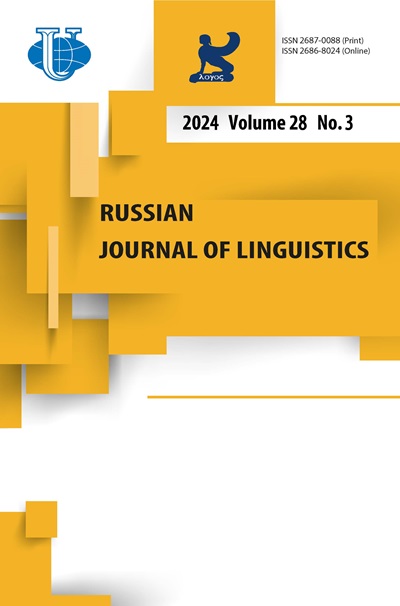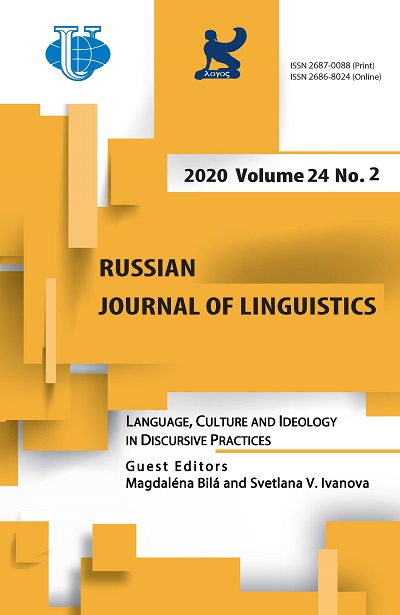Рецензия на книгу Culpeper, Jonathan, Michael Haugh and Dániel Z. Kádár (eds.). 2017. The Palgrave Handbook of Linguistic (Im)politeness. London: Palgrave Macmillan. ISBN 978-1-137-37507-0
- Авторы: Эцуко О.1
-
Учреждения:
- Токийский университет науки
- Выпуск: Том 24, № 2 (2020): Язык, культура и идеология в дискурсивных практиках
- Страницы: 493-505
- Раздел: РЕЦЕНЗИИ
- URL: https://journals.rudn.ru/linguistics/article/view/24103
- DOI: https://doi.org/10.22363/2687-0088-2020-24-2-493-505
Цитировать
Полный текст
Аннотация
-
Об авторах
Оиси Эцуко
Токийский университет науки
Автор, ответственный за переписку.
Email: oishi@rs.tus.ac.jp
профессор лингвистики
Токио, ЯпонияСписок литературы
- Ädel, Annelie. 2010. How to use corpus linguistics in the study of political discourse. In Michael McCarthy & Anne O’Keeffe (eds.), Routledge Handbook of Corpus Linguistics, 591-604. London: Routledge
- Archer, Dawn. 2011. Cross-examining lawyers, facework and the adversarial courtroom. Journal of Pragmatics 43. 3216-3230
- Arundale, Robert B. 2006. Face as relational and interactional: A communication framework for research on face, facework, and politeness. Journal of Politeness Research 2 (2). 193- 216
- Austin, John. L. 1975. How to Do Things with Words. Oxford: Oxford University Press.
- Boxer, Diana & Florencia Cortés-Conde.1997. From bonding to biting: Conversational joking and identity display. Journal of Pragmatics 27. 275-294.
- Brown, Penelope. 1980. How and why are women more polite: Some evidence from a Mayan community. In Sally McConnell-Ginet, Ruth Borker & Nelly Furman (eds.), Women and Language in Literature and Society, 111-136. New York: Praeger.
- Brown, Roger & Albert Gilman. 1989. Politeness theory and Shakespeare’s four major tragedies. Language in Society 18. 159-212
- Brown, Penelope & Stephen Levinson. 1978/1987. Politeness: Some Universals in Language Use. Cambridge: Cambridge University Press
- Bunrnley, David. 2003. The T/V pronouns in later Middle English literature. In Irma Taavitsainen & Andreas H. Jucker (eds.), Diachronic Perspectives on Address Term Systems, 27-45. Amsterdam/Philadelphia: John Benjamins
- Busse, Ulrich. 2002. Changing politeness strategies in English requests: A diachronic investigation. In Jacek Fisiak (eds.), Studies in English Historical Linguistics and Philology: A festschrift for Akio Oizumi, 17-35. Frankfurt/Main: Peter Lang
- Butler, Judith. 1990. Gender Trouble: Feminism and the Subversion of Identity. London: Routledge
- Culpeper, Jonathan. 1996. Towards an anatomy of impoliteness. Journal of Pragmatics 25. 349-367
- Culpeper, Jonathan. 2005. Impoliteness and entertainment in the television quiz show: The Weakest Link. Journal of Politeness Research 1 (1). 35-72
- Culpeper, Jonathan. 2011. Impoliteness: Using Language to Cause Offence. Cambridge: Cambridge University Press
- Eelen, Gino. 2001. A Critique of Politeness Theories. Manchester: St. Jerome
- Foolen, Ad, Ulrike M. Lüdtke, Timothy P. Racine & Jordan Zlatev (eds.). 2012. Moving Ourselves, Moving Others: Motion and Emotion in Intersubjectivity, Consciousness and Language. Amsterdam: John Benjamins
- Garcés-Conejos Blitvich, Pilar. 2013. Face, identity, and (im)politeness: Looking backwards, moving forward-from Goffman to Practice Theory. Journal of Politeness Research 9 (1). 1-33
- Goffman, Erving. 1967. Interactional Ritual: Essays on Face-to-Face Behavior. Allen Lane: The Penguin Press
- Graham, Sage L. 2007. ‘Do unto others’: Gendered identity construction in an online religious community. In Allyson Jule (eds.), Language and Religious Identity: Women in Discourse, 73-1103. Basingstoke: Palgrave
- Grice, H. Paul. 1975. Logic and conversation. In Peter Cole & Jerry L. Morgan (eds.), Syntax and Semantics, Speech Acts, 3. 41-58. New York: Academic Press. (reprinted Grice 1989).
- Grice, H. Paul. 1989. Studies of the Way of Words. Cambridge, MA: Harvard University Press.
- Haugh, Michael. 2007. The discursive challenge to politeness research: An interactional alternative. Journal of Politeness Research 3. 295-317.
- Haugh, Michael & Wei-Lin M. Chang. 2019. Indexical and sequential properties of criticisms in initial interactions: Implications for examining (im)politeness across cultures. Russian Journal of Linguistics 23 (4). 909-929.
- Homes, Janet. 1988. Paying compliments: A sex-preferential positive politeness strategy. Journal of Pragmatics 3. 445-465
- Homes, Janet. 1993. New Zealand women are good to talk to: An analysis of politeness strategies in interaction. Journal of Pragmatics 20 (2). 91-116
- Homes, Janet. 1995. Women, Men and Politeness. London: Longman
- Janney, Richard & Horst Arndt. 1992. In Richard J. Watts, Sachiko Ide & Ehlich Konrad (eds.), Politeness in Language: Studies in Its History, Theory and Practice, 21-41. Berlin: Mouton de Gruyter
- Kádár, Dániel Z. 2011. Postscript. In Linguistic Politeness Research Group (LPRG) (eds.), Discursive Approaches to Politeness, 245-262. Berlin: Mouton de Gruyter
- Kohnen, Thomas. 2008. Directives in Old English: Beyond politeness? In Andreas H. Jucker & Irma Taavitsainen (eds.), Speech Acts in the History of English, 27-44. Amsterdam/Philadelphia: John Benjamins
- Lakoff, Robin T. 1973. The logic of politeness; or minding your P’s and Q’s. In Claudia Corum, Thomas C. Smith-Stark & Ann Weiser (eds.), Papers from the Ninth Regional Meeting of the Chicago Linguistic Society, 292-305. Chicago: Chicago Linguistic Society
- Lakoff, Robin T. 1975. Language and Woman’s Place. New York: Harper and Row. Leech, Geoffrey N. 1983. Principles of Pragmatics. London: Longman.
- Lewis, David. 1969. Convention: A Philosophical Study. Cambridge MA: Harvard University Press.
- Lyons, John. 1977. Semantics. 1. 2. Cambridge: Cambridge University Press.
- Mills, Sara. 2011. Discursive approaches to politeness and impoliteness. In Linguistic Politeness Research Group (LPRG) (eds.), Discursive Approaches to Politeness, 19-56. Berlin: Mouton de Gruyter.
- Peirce, Charles S. 1901. Index (in exact logic). In James M. Baldwin (eds.), Dictionary of Philosophy and Psychology, 1. 531-532. London: Macmillan and Co.
- Rockwell, Patricia A. 2006. Sarcasm and Other Mexed Messages: The Ambiguos Ways People Use Language. Queenston: Edwin Mellon Press.
- Scollon, Ronald & Suzanne W. Scollon. 2001. Intercultural Communication: A Discourse Approach, 2nd edn. Oxford: Blackwell.
- Searle, John. 1969. Speech Acts: An Essay in the Philosophy of Language. Cambridge: Cambridge University Press.
- Short, Mick. 1996. Exploring the Language of Poems, Plays and Prose. London: Longman. Spencer-Oatey, Helen (eds.). 2001. Culturally Speaking: Managing Rapport Through Talk Across Cultures. 1st edn. London/New York: Continuum
- Spencer-Oatey, Helen (eds.). 2008. Culturally Speaking: Culture, Communication and Politeness Theory. 2nd edn. London/New York: Continuum.
- Strawson, Peter F. 1964. Intention and convention in speech acts. The Philosophical Review 73 (4). 439-460.
- Terkourafi, Marina. 2001. Politeness in Cypriot Greek: A Frame-Based Approach. Cambridge: Cambridge University Press.
- Terkourafi, Marina. 2007. Toward a universal notion of face for a universal notion of cooperation. In Istvan Kecskés & Laurence R. Horn (eds.), Explorations in Pragmatics: Linguistic, Cognitive, and Intercultural Aspects, 307-338. Berlin: Mouton de Gruyter.
- Terkourafi, Marina. 2014. The importance of being indirect: A new nomenclature for indirect speech. Belgian Journal of Linguistics 28 (1). 45-70.
- Terkourafi, Marina. 2019. Indirectness in the age of globalization: A social network analysis. Russian Journal of Linguistics 23 (4). 930-949.
- Tracy, Karen. 2008. Reasonable hostility: Situation-appropriate face-attack. Journal of Politeness Research 4. 169-191
- Tzanne, Angeliki & Maria Sifianou. 2019. Understandings of impoliteness in the Greek context. Russian Journal of Linguistics 23 (4). 1014-1038.
- Van der Bom, Isabelle & Sara Mills. 2015. A discursive approach to the analysis of politeness data. Journal of Politeness Research 11(2). 179-206.
- Watts, Richard J., Sachiko Ide & Ehlich Konrad (eds.). 1992. Politeness in Language: Studies in Its History, Theory and Practice. Berlin: Mouton de Gruyter
- Wolfson, Nessa. 1988. The bulge: A theory of speech behaviour and social distance. In Jonathan Fine (eds.), Second Language Discourse: A Textbook of Current Research, 21- 38. Norwood: Ablex

















